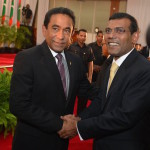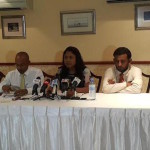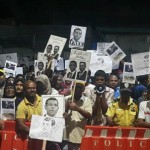The government’s abolition of the Island Development Committees (IDC) is a blow against democracy in the Maldives, the Dhivehi Qaumee Party (DQP) has said.
“This is a mockery of the public and the Constitution,” the party said, “and more a feature of autocratic rule than democracy.”
The Maldivian Cabinet dissolved the IDCs – elected bodies of five to seven members, functioning like a local council – last month after
courts ruled they had no legal authority under the new constitution.
Government-appointed advisory boards will administer the islands until local councils can be elected, assuming a decentralisation bill (currently at committee stage) is passed by parliament.
“We think this is a step backwards for democracy,” said DQP Secretary General Abdullah Ameen, who accused the government of strengthening its territorial control through autocracy.
“Even during Gayoom’s time the IDCs were the only institutions where people on the islands saw democracy practiced, and were among the only democratic institutions in the country,” he said.
The move, claimed independent MP Mohamed Nasheed on DhiTV last night, amounted to “burying democracy in the islands”.
Under the terms of the constitution, the elections of island, atoll and city councils were to be held before July 1, 2009, in order to provide for decentralised administration of the country.
Instead, argued the DQP, the government had not only missed the deadline but was using the dissolution of the IDCs to claim island assets such as powerhouses for privatisation.
“Dismissing the IDCs and appointing advisory boards doesn’t accomplish anything,” Ameen said.
The deadline for the local elections elapsed after the parliamentary election was postponed from February to May because MPs failed to pass the necessary legislation.
Deputy Home Minister Ahmed Shafeeq acknowledged that island assets were currently being valued through the courts before being handed over to utility companies, but said the government was waiting for the”new rules and procedures” in the decentralisation bill to be implemented before establishing elected and salaried island and atoll councils.
“After the new constitution was introduced the Island Development Committees were no longer lawful – and that’s a problem for such an institution,” he said.
“They have no legal basis and we can’t just [continue] as if they do,” he added, explaining that the government-appointed advisory boards were only a temporary measure.
Besides dissolving the IDCs, the cabinet decided to allow the development of tourist guest houses on inhabited islands in the hope of generating additional income from visitors.





I believe this is good move as the IDCs on most Islands do not consist of elected members but only appointees. They are not re-elected as required under the current regulations and normally consist of heads of government institutions on the islands.
In order to fill the vacuum, election of Island Councils should be expedited. The Constitutional deadline for passing the decentralisation bill and hold elections has passed. The Majlis must give this bill priority and complete it immediately.